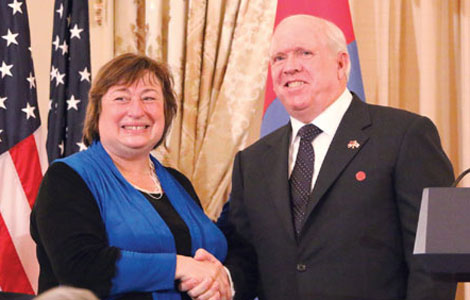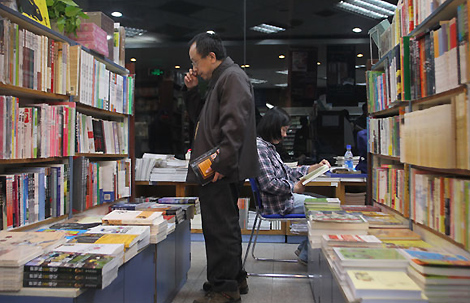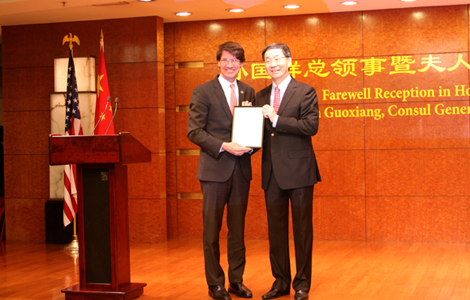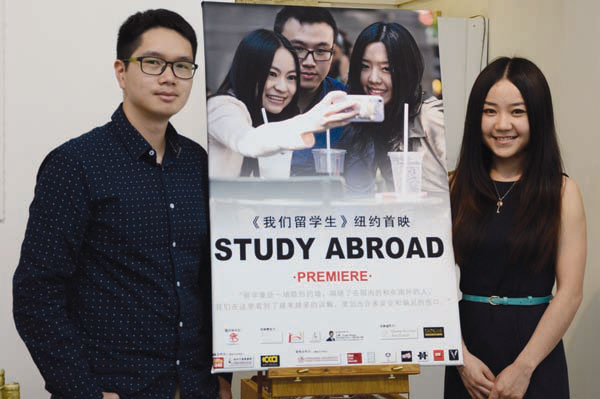Film takes on Chinese stereotypes in US
Updated: 2014-12-05 14:27
By Niu Yue in New York(China Daily USA)
|
||||||||
|
Yang Yung-jen (left), director of Study Abroad, and Jiang Ying, the movie's producer, with a movie poster prior to the film's premier in New York on Friday. Provided to China Daily |
What have Chinese students learned from several years in the United States?
They "major in luxury cars", according to a report in Bloomberg Businessweek in December 2013, about Chinese students buying large numbers of luxury cars in the US.
"Most Chinese students studying abroad are not rich at all," said Jiang Ying, a 27-year old fashion marketer in New York. "Even if some do come from affluent families, they are also working hard."
To fight the stereotypes, the Fordham University MBA graduate made a 30-minute movie, Study Abroad, that will premiere Friday night at the Helen Mills Theater in Manhattan.
Based on true stories Jiang collected, the film aims to reveal other aspects of Chinese students' life in the US, such as finding an apartment and making American friends.
"We are not saying whether Chinese students are good or bad," said Jiang, who is originally from Shanxi province. "We list you facts, and you form your thoughts based on what you see," she said.
The movie was inspired by the murder of a Chinese couple in California in 2012. Early on the morning of April 11, 2012, two 23-year-old graduate students, Qu Ming and Wu Ying, were shot to death near the University of Southern California campus in Los Angeles, while sitting in a BMW car.
One Associated Press report said that Chinese students "typically skew wealthier, because they have to be able to afford a school's tuition without financial aid".
Chinese media focused largely on the sensational theme of a man and a woman in a luxury vehicle after midnight.
"I feel very shocked by how people look at this," said Jiang. "It's about two Chinese students killed, not about whether they are in a good car or not."
The BMW turned out to be second-hand, with 80,000 miles on it and worth around $10,000. Subsequent media reports showed that the victims were not particularly wealthy.
Jiang met Yang Yung-jen, a 28-year-old MFA candidate at the City College of New York, in December 2012. They selected three stories out of 20 potential ideas and came up with a screenplay. As the only person on the team with professional training, Yang worked as director, cameraman and editor; Jiang covered most of the expenses, which came to a few thousand dollars, and she has been struggling to pay back her credit card.
"It was a low-budget movie, but we tried our best to make it," Yang said. "Our whole team had a dream for this movie."
The production took more than a year, as most of the crew had full-time jobs with only weekends available.
"I had to wake up early to work, and even earlier to make the movie," said Chen Wenjie, a lead actress in the movie and a full-time advertising sales insights and strategy analyst.
There are more than 260,000 Chinese students in the US, making up 30 percent of international students in the country, according to the Institute of International Education.
However, communication between Chinese and American students remains limited, said Niu Muge, a Columbia University Journalism School master's degree candidate and co-founder of Channel C, an online video channel airing segments about Chinese students' thoughts and lives.
"Americans value diversity, but if there were no communication, diversity would never be realized," she said. "There are some misunderstandings about us. People think we are nerds or really rich kids."
They also are misunderstood in China, said Jiang.
"Problems we encounter are very difficult to describe to others," she said. "For example, you need a lot of skills that are never taught in China to do a good presentation. But others would just say your English isn't good enough when there is a problem."
After its New York premiere, Study Abroad will be screened at Boston University and the University of Pennsylvania in 2015, and also in Beijing and Taiyuan in Shanxi province.
Lu Huiquan in New York contributed to this story.

 Across Canada Dec 10
Across Canada Dec 10
 Jack Ma in running for Time magazine Person of Year
Jack Ma in running for Time magazine Person of Year
 Linden Center hotel misses award
Linden Center hotel misses award
 China: New climate change fund 'market-based'
China: New climate change fund 'market-based'
 The best books of 2014
The best books of 2014
 Third panda triplet joins siblings and mother
Third panda triplet joins siblings and mother
 Diplomat's farewell
Diplomat's farewell
 China Construction Bank Toronto Branch Grand Opening Ceremony
China Construction Bank Toronto Branch Grand Opening Ceremony
Most Viewed
Editor's Picks

|

|

|

|

|

|
Today's Top News
Facebook may need a partner to get into China
BOC adds to China's portfolio of NY property
Watchdog goes online to fight graft
China Construction Bank Toronto Branch Grand Opening Ceremony
China: New climate fund to be 'market-based'
Former senior economic planning official sentenced to life in prison
HK police declare to clear remaining occupy sites
China to advance climate goals
US Weekly

|

|








